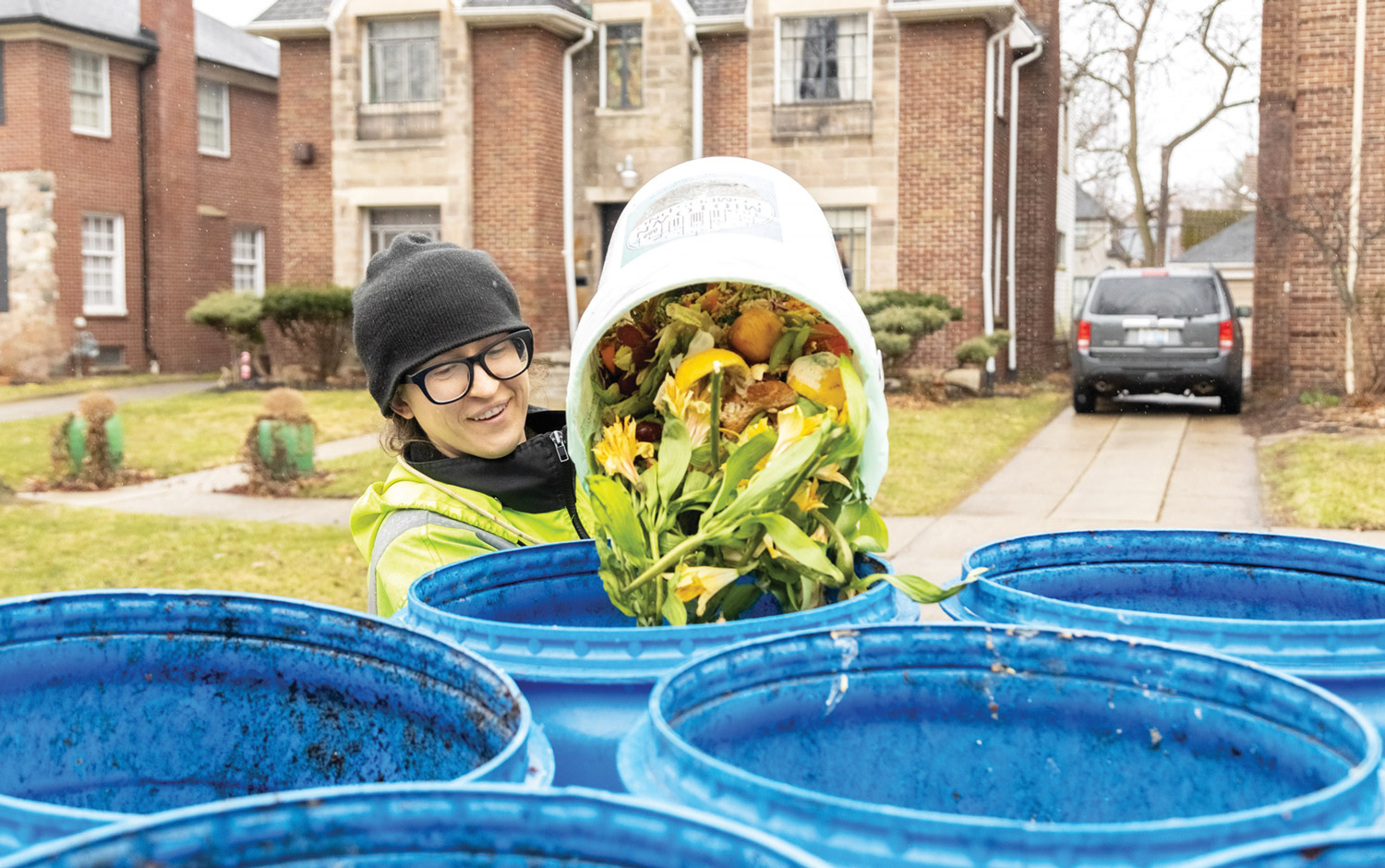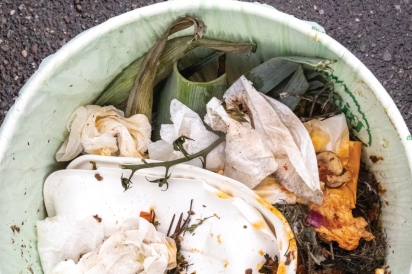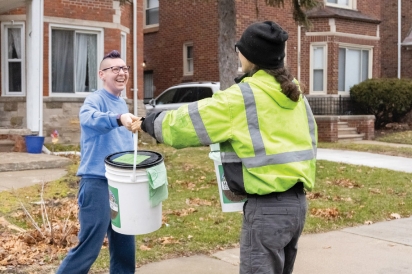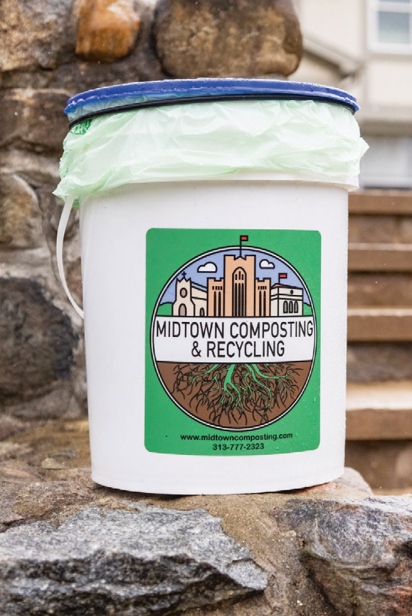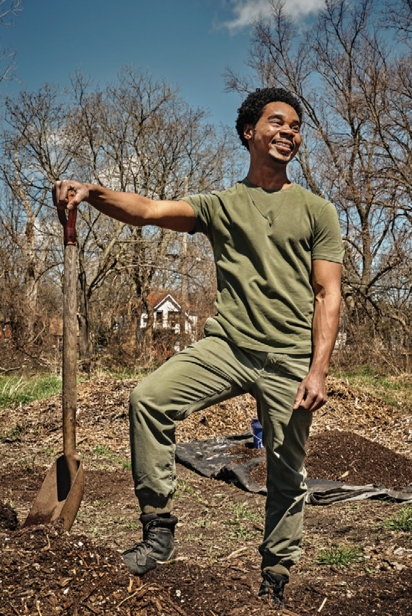Waste Not Area Food Compositing is Hot, Hot, Hot
Saving the Planet One Compost Bucket at a Time
SPRINGTIME HAS A WAY of bringing people in touch with the earth like no other season.
Garden centers bustle with enthusiastic customers stocking up on bags of potting soil and compost, bright annuals and veggie starts. After a long Michigan winter, everyone seems to want to get their hands in the dirt.
Somewhere along the way, we’ve learned that compost is a good thing to add to the soil as we prepare our garden beds. What we might find surprising is that composting food scraps is one of the most important things we can do to reduce our carbon footprint and make a positive impact on Mother Earth.
Whether that means collecting food scraps in a backyard bin, participating in a residential composting program or partnering with a commercial composting service, the options are increasing for Southeast Michigan residents and businesses that want to make a difference.
CHANGE STARTS AT HOME
Michael Edwards found his way into the business when he was seeking compost for his garden. He ordered a few bags from Midtown Composting in Detroit, and it was delivered to his home by owner Tim Campbell. After meeting with Campbell and learning about his business, Edwards was intrigued.
“He explained that he picks up food waste from restaurants and residents and turns it into compost. I didn’t think you could make a business doing that, but I knew the gas emissions created from food waste sitting in landfills is a massive issue, even more potent than carbon dioxide,” Edwards says. “I did some research, and I knew I wanted to get involved.”
He approached Campbell about partnering, and the two agreed that it would be a great way to expand the business and serve more customers. Edwards and his wife, Kristina Manolescu, took over the residential side of the business, serving homeowners and small businesses, while Campbell focused on restaurants and institutions.
A few years later, Midtown Composting Residential serves more than 900 residential customers and 60 small businesses in the Detroit Metro area. For a monthly charge of $16, customers receive a weekly home pickup of food scraps, and, in return, get three free buckets of compost annually, with an option to purchase more.
Initially, Edwards made the compost in Detroit, but as the business grew he began partnering with Tuthill Farms and Composting, Inc., in South Lyon and Country Oaks Landscaping in Burton, both of which are equipped to compost on a much larger scale.
“Any business I’ve been involved in, I want it to benefit humanity and the environment,” says Edwards. “There’s very little compromise in this business. We don’t have to market or push sales. More and more people are interested.”
Recently, he began offering community-supported agriculture (CSA) subscriptions for customers who want to receive a weekly box of produce. During the summer months, this includes produce that he grows or obtains from local farmers. Other times of the year, he picks up food from places like the Detroit Produce Terminal.
“For me, it’s about small-circle sustainability, growing our own food, becoming less reliant on big agriculture. I want to help make sure the local farmers are getting their food to the customer without the middleman and transportation costs. I want to be a part of making that better.”
“I love everything about Detroit and I’m passionate about working more closely in the neighborhoods, hoping to eventually help people start a garden, learn to grow their own food and be healthier.”
KNOW YOUR COMPOSTER
Amy Freeman is an independent consultant, who likes to call herself “compost maven,” a title that comes from the book The Tipping Point: How Little Things Can Make a Big Difference by Malcolm Gladwell, which describes mavens as “information specialists.”
“I truly love what I do,” she says. “This is the perfect vocation for me. It has to do with my love and respect for this planet and what we have.”
Freeman’s passion stems from this fact: About 40 percent of food around the world ends up wasted.
“Forty percent is a sobering number. We need to reduce that percentage. When we think of hunger and deficits in nutrition, we need to be more mindful of what food is and how important it is that it goes back to the gardens and farms,” she says.
Alongside Country Oaks owner Mark Cherry, Freeman worked to implement new technologies to create the highest-quality compost, certified by the U.S. Composting Council (USCC) Seal of Testing Assurance (STA). The operation features a state-of-the-art composting system that uses compost aeration and heat recovery via Agrilab Technologies, which is used to heat their buildings. They are one of three companies in Michigan who have been awarded the USCC STA.
“Know your composter—know where it’s coming from and how it’s made,” says Freeman. “It’s important to know your farmer, but also your composter. All compost is not created equal.”
To make compost, they use inputs from trees and yard debris from landscapers, and food scraps and cardboard from restaurants and other businesses in the local area. Once produced, the compost is available for sale in different blends, both bulk and bagged, at their flagship landscape supply store in Clarkston and in Burton.
Recently, Country Oaks formed CO Sustainability, a new partnership with Midtown’s Tim Campbell. Campbell collects food scraps from restaurants and institutions and brings them to their facility. This partnership has allowed for efficiencies at both Midtown and Country Oaks in terms of capacity and pick-up routes.
The newest aspect of the operation is an aquaponics system, where they grow tropical tilapia fish, kept warm from the compost heat recovery system, and hydroponic salad greens, fed from the fish tank’s nutrient-rich water. As a result, the chefs who send their food scraps have the opportunity to purchase these salad greens for their restaurants.
“That compost is going back to grow nutrient-dense foods, through the foods that we grow, but also through the farmers that purchase our compost. Healthy soils are critical to healthy food. Good quality compost as an amendment is critical for that whole process,” says Freeman.
“We have such a gift and a responsibility. That truly is the core of it. I want to bring awareness to thinking of waste differently, that it has a higher purpose and the importance of those materials going back into the soil in the form of organic matter.”
A popular hometown bistro in Fenton, The Laundry, began working with Country Oaks last year. The food waste and cardboard they collect is turned into compost for their kitchen gardens where they grow herbs and vegetables during the summer.
“All of this has reduced our garbage pickups by two-thirds. It’s a win-win because garbage pickup is so costly, says Marketing Manager Jasmyn Lee. “We’re giving back to the environment. We never had a way to do that until Country Oaks approached us. We think it’s wonderful.”
BUILDING A HEALTHY, RESILIENT COMMUNITY
Community composting has happened in Ann Arbor since 1980. The first compost site began that year, along with curbside collection of yard trimmings. In 2006, the city began curbside collection of food scraps, and over the past 40 years expanded their services and capacity, which today includes free weekly curbside composting pickup for single-family homes within the city limits, mid-April through mid-December, with monthly curbside pickups from January through March.
Jennifer Petoskey, the solid waste outreach and compliance specialist for the City of Ann Arbor, is motivated by the positive impact that her work has on the environment and her community.
“If you look at municipal solid waste from households, 30—40 percent are organic matter, and we need to reduce the amount of that waste in landfills. The materials just sit there in a landfill. They put a cap over it, as they have to cover it, which reduces the amount of oxygen [required by the compost to break down]. It degrades very slowly and produces methane, which is more potent than carbon dioxide,” she explains.
“There is valuable material in that organic matter. So, how do we capitalize on those valuable nutrients? If we compost it, it becomes available to put back into the environment. It builds soil structure, allows soil to hold onto water, which is better for the growth of plants. People don’t realize that in the landfill, things don’t break down very fast.”
In addition to the weekly curbside pickup of yard trimmings and food scraps, the City of Ann Arbor offers free compost to residents. On Saturdays from 7—11 a.m., beginning in April, residents can pick up one free cubic yard of compost, until supplies run out. These materials can be picked up from the compost facility on the south side of town. Residents can also drop off one cubic yard of food scraps, leaves and brush per day for free, and anyone can purchase compost, mulch and wood chips.
The City contracts with WeCare Denali, which has operated the composting facility on Platt Road using aerated windrow technology to produce a high-quality compost for the past 10 years. By doing this, the City keeps about 32 percent of its waste out of the landfill by composting or recycling it, according to Petoskey, who explains that part of their A2ZERO carbon neutrality plan is to not produce any greenhouse gas emissions by 2030.
“Strategy five of A2ZERO is to change the way we use, reuse and dispose of materials. The plan aims to expand our composting program, do more education and even encourage a plant-based diet,” Petoskey says.
“What’s really important to me is this idea of going back to nature. There is no such thing as waste. You can take this organic matter and turn it into something valuable. It enriches the soil, enriches people’s lives, being a part of a circular economy. It’s what our grandparents did. Goods have value, which is in opposition to our current throwaway culture. When we compost, we are participating in that circular economy and finding value in materials, which builds community, resilience and health.”
Midtown Composting
midtowncomposting.com
Country Oaks Landscape Supply and Composting:
countryoakslandscapesupply.com/compost
City of Ann Arbor Composting
A2gov.org/compost | 734-794-6320
Community Climate Action Millage
City of Ann Arbor, November 2022 Ballot www.mlive.com/news/ann-arbor/2021/12/inaction-is-irresponsible-ann-arbor-climate-action-tax-headed-to-ballot.html
WeCare Denali Compost, Soil and Mulch
4170 Platt Rd, Ann Arbor, MI 48108 /www.wecarecompost.com/wecare-products/locations/ann-arbor-mi/
KEY FACTS REGARDING ORGANICS RECYCLING AND COMPOST USE
Compost Research and Education Foundation
• The use of landfill space and incineration can be reduced by at least one-third when organics are recycled. Focused attention on recycling organic residuals is key to achieving high-waste diversion rates.
• Methane, a greenhouse gas 25 times as powerful as carbon dioxide, can be significantly reduced through the recycling of organics instead of their being landfilled.
• Soil health and productivity are dependent on organic matter— the essence of compost—to provide the sustenance for the biological diversity in the soil. Plants depend on this to convert materials into plant-available nutrients and to keep the soil well-aerated. Additional benefits include the reduced need for pesticide usage to ward off soil-borne and other plant diseases.
• Compost offers a significant answer to climate change mitigation. Compost’s return to the soil serves as a “carbon bank,” helping to store carbon thereby removing it from the atmosphere.
• Compost is a huge benefit for both water conservation and quality. When used in water quality projects, compost binds pollutants to the organic material and prevents them from entering our lakes, wetlands, streams and rivers. Soil erosion is mitigated, and water-holding capacity improved through compost’s enhancement of soil structure, binding soil particles together.
WHAT IS COMPOSTING?
Composting is the natural process of recycling organic matter, such as leaves and food scraps, into a valuable fertilizer that can enrich soil and plants. Anything that grows decomposes eventually; composting simply speeds up the process by providing an ideal environment for bacteria, fungi and other decomposing organisms (such as worms, sowbugs and nematodes) to do their work. The resulting decomposed matter, which often ends up looking like fertile garden soil, is called compost. Fondly referred to by farmers as “black gold,” compost is rich in nutrients and can be used for gardening, horticulture and agriculture.
Republished with permission from Natural Resources Defense Council
A LABOR OF LOVE: SCRAP SOILS
Launched in the spring of 2020, Scrap Soils is a startup nonprofit business with a vision to minimize greenhouse gasses by way of collecting food scraps to turn into compost, and by developing community partnerships to make a real and lasting impact.
“I was passionate about gardening, which turned into a passion for composting,” says founder and President Ricky Blanding. “I first started collecting food scraps from serving jobs for my garden. When you realize that they create greenhouse gasses that have a negative impact on the environment, you also realize that we have control over this, and we still have time to do something about it. People don’t understand how powerful an impact we could make if more of us did this.”
“Every day in America, each person wastes an average of one pound of food per day, and the more you make, the higher that goes up. That’s a lot of food wasted and a lot of food scraps that we could divert to become compost. If we make people believe they could do this—we could actually do this!”
Blanding and his business partners, Liana Li and Roshi Fu, began signing up members and collecting food scraps in neighborhoods around the Metro Detroit area and turning it into compost on the grounds of Detroit Blight Busters, their fiduciary.
“It’s really hard work, but it’s a really special thing to drive up to our site and unload a massive amount of food and know that it was being taken care of the right way. It’s a beautiful thing,” says Blanding.
Though they’ve temporarily suspended services while University of Michigan business students work on their capstone projects devising a business plan for a sustainable and scalable future, Scrap Soils still has volunteer work available.
“We are so thankful to U of M for working with us. The deliverables are invaluable,” says Blanding, adding that they eventually plan to hire logistics staff, a volunteer coordinator and to develop relationships with local urban farms.
“We understand that there are many ways to do this. The way we’re doing it is one way, but the more people we get, the better,” says Blanding. “This is not only for entrepreneurs, but also for the average person who has a backyard. It’s for everybody.”
Composting is not something one business can own, says Blanding, who sees encouraging everyone to do it and making it available to all as a moral imperative. “The more businesses we can partner with the better.”
“Beyond the joy of composting—which is joy because your trash literally turns into the most fertile soil—there is the urgency that I want future generations to have a world to live in that is better than the one we have.”


